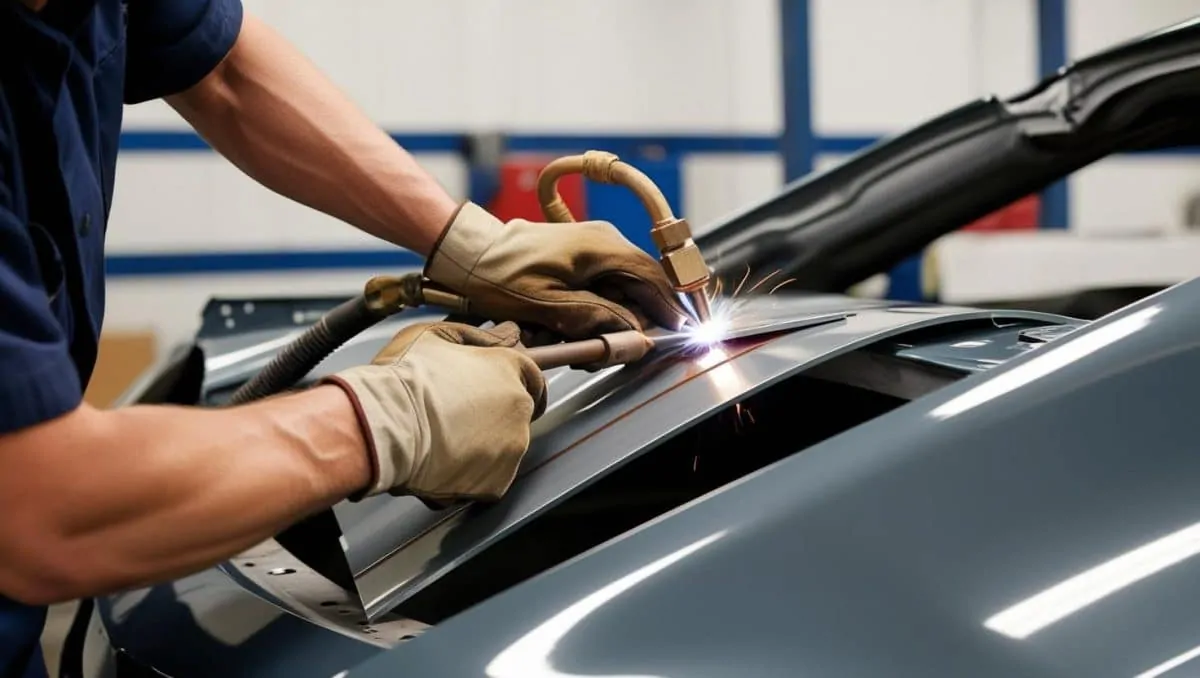
Owning a vehicle comes with the responsibility of keeping it in top condition. While many people focus on the engine or suspension system, they often overlook the car’s bodywork. However, the material used in autobody repair makes a significant difference. One such material that stands out is 18-gauge metal, a favorite among professionals for its perfect balance of strength, flexibility, and cost-efficiency.
Regardless of whether you want to know the price of “engine repair” on the web or are just curious about the costs, this guide has every single piece of detail you require about your car engine and auto body repair in Philadelphia.
Understanding the 18-Gauge Metal Thickness
When selecting materials for autobody repair, it’s essential to strike the right balance between durability and ease of use. Here’s where 18-gauge metal shines.
Unlike thinner 20- or 22-gauge metals, which may be easier to handle but lack strength, or thicker options that are harder to work with, however, this metal offers the ideal midpoint. That’s why experts in autobody repair, such as Dr. Ralph’s Automotive, rely on it for dependable results.
However, expert auto shops require more usable precision and quality. Therefore, this metal thickness serves as the perfect midpoint.
Key Advantages of Using 18-Gauge Metal in Auto Body Repair
Sturdiness and Resistance to Damage
Vehicles are exposed to stress from driving and harsh weather. The strength of 18-gauge metal helps protect hinged panels like hoods, fenders, and doors.
That results in making these parts of a car survive all the dings and dents. Its thickness enables the panels to keep their shape while resisting damage, which is crucial for vehicle exteriors.
Workability and Flexibility
The most remarkable characteristic of 18-gauge metal thickness is its workability. Auto body repair specialists can effectively cut, bend, and shape this metal to suit the contours of a vehicle, from repairing a miniature dent to replacing an entire panel.
What’s more, this standard of metal thickness can be stitched using different welding methods like MIG or TIG welding, which are standard in most auto body repair shops.
Weight Considerations
The weight of a vehicle impacts its fuel efficiency and performance significantly. Thicker metals offer more strength but also add unnecessary weight. This negatively affects a car’s handling and fuel efficiency.
18-gauge metal presents an answer within the bounds of weight and strength, thus making it ideal for vehicles designed with heightened efficiency in mind. This is particularly important for drivers who must navigate urban streets, as it helps maintain optimal performance after the repair.
Corrosion Resistance
Material choice is critical to long-term vehicle maintenance in a city like Philadelphia, where humidity and road salt can exacerbate corrosion. Auto body repair often utilizes 18-gauge metal sheets, which are either made from galvanized steel or coated with protective finishes to prevent rust.
Repaired areas should be clean and in good condition. Weather elements should not alter these surfaces.
Using 18-gauge metal or similarly priced materials does not allow for appealing body repairs. At Dr. Ralph’s Automotive, we focus on protecting customer investments against environmental wear, so we use high-quality materials, allowing us to deliver repairs that endure.
Cost-Effectiveness
For any business, blending quality and affordability is a major consideration when providing a customized solution. Most customers choose custom solutions to reduce costs.
18-gauge metal is cost-effective in performing repairs or enhancing auto body parts due to its competitive pricing and relative ease of access. Its pliability allows for easier handling, reducing labor time and costs. Less flexible materials often take more time to work with.
18-gauge metal parts serve the best interests of drivers looking for reliable auto body repairs, coupled with a low cost of reliability, safeguarding them from premature wear.
Uses of 18-Gauge Metal in Auto Body Repair
18-gauge metal is quite economical and exhibits measurable strength, which makes it suitable for various aspects of auto body repair, such as:
- Panel Replacement: Used to replace broken fenders, hoods, or quarter panels because of their strength and ability to hold form.
- Dent Repair: Filling and smoothing a dent requires a workable support, and this metal provides this.
- Custom Fabrication: Useful in making custom parts or patches that are specific to a vehicle make or model.
- Structural Repairs: Employed in sections where moderate reinforcement is needed without heavy loading of a part.
18-gauge metal thickness provides dependable results, whether in addressing cosmetic damage or extensive collision repairs.
Why Dr. Ralph’s Automotive Is the Best Choice For Auto Body Repair in Philadelphia
Repairing vehicles is more than just fixing them. At Dr. Ralph’s Automotive, we know this all too well. We use the right materials for every repair, which puts us miles ahead of our competition.
Our trained specialists work this metal into your vehicle’s chassis to bring it back to factory specifications. Its pliability allows for easier handling, reducing labor time and costs. Less flexible materials often take more time to work with.
Conclusion
In Philadelphia, the industry standard for auto body repair is 18-gauge metal, as it is cost-effective in combination with strength and workability. It exhibits stress, corrosion, and weight efficiency, making it ideal for professional shops like Dr. Ralph’s Automotive.
Whether you’re fixing dents or replacing entire panels, 18-gauge metal delivers strong and lasting results. It ensures your vehicle looks great and runs reliably for years.
If you need professional auto body repair in Philadelphia, request quality workmanship by calling Dr. Ralph’s Automotive today to schedule a consultation.
